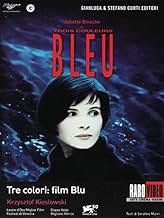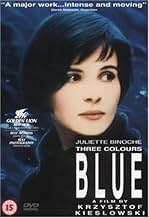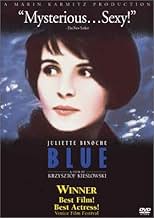Una mujer lucha por encontrar una manera de vivir su vida después de las muertes de su esposo e hijo.Una mujer lucha por encontrar una manera de vivir su vida después de las muertes de su esposo e hijo.Una mujer lucha por encontrar una manera de vivir su vida después de las muertes de su esposo e hijo.
- Dirección
- Guionistas
- Elenco
- Premios
- 22 premios ganados y 19 nominaciones en total
Benoît Régent
- Olivier
- (as Benoit Regent)
Charlotte Véry
- Lucille
- (as Charlotte Very)
Hélène Vincent
- La journaliste
- (as Helene Vincent)
Yann Trégouët
- Antoine
- (as Yann Tregouet)
Opiniones destacadas
Blue is one of those little movies that grows on you. The more you think about it the more you like it. That's not to say that it's not enjoyable to view; the cinematography and music are marvelous. But this is Juliette Binoche's movie. Everything revolves around her character, Julie, who, in the first scene, survives an automobile accident that claims the lives of her famous composer husband and her five-year-old daughter. Now alone the remainder of the movie delves into Julie's long emotional recovery. Not traumatic, or depressing as the subject matter may imply it is instead subtle, graceful, and beautiful.
An accident results in loss and pain, the rejection of a world that you refrain, you seek withdrawal, isolation, segregation, separation, and transition to a life, where you abstain. But seclusion still has links and ties and cords, that retract and pull and cannot be ignored, reconnection through a box, reveals a secret that's unlocked, that begins to reconnect, and to restore.
It's a wonderful performance from Juliette Binoche as she elegantly weaves Kieslowski's tale of freedom into a contemporary setting. Packed full of symbolism that requires numerous visits to absorb, you may find a myriad of interpretations of your own too.
It's a wonderful performance from Juliette Binoche as she elegantly weaves Kieslowski's tale of freedom into a contemporary setting. Packed full of symbolism that requires numerous visits to absorb, you may find a myriad of interpretations of your own too.
Instead of saying which is the best and worst (though have often heard 'Red' cited best and 'White' the weakest, though all three films are generally very highly thought of) of Krzysztof Kieslowski's "Three Colours" trilogy, it will just be said that all three films in the trilogy are must-watches in their own way.
The first film in the trilogy 'Three Colours: Blue' serves as a very poignant exploration of grief and liberty (in the emotional sense), and to me it is one of the most moving and interesting depictions of grief and liberty in film. It is heavily symbolic, with its intricate use of music, the dominant use of the colour blue in the colour palette, its interesting use of fade outs (though actually different to their usual use, representative of time standing still rather than it passing or a scene conclusion), links to the main character's past (here the use of falling) and the bottle recycling, but not in an incoherent sense.
Visually, 'Three Colours: Blue' looks stunning. The whole film is shot with aesthetic grace and elegance and while the use of blue is dominant for symbolic reasons it is never gimmicky or cheap. Kieslowski's direction is thoughtful and never intrusive, and the intricate music score and the symbolic way it's utilised (representing Julie's struggles with isolation) is inspired, "Song for the Unification of Europe" is one of the most emotional tracks of music in any film seen by me recently.
Story-wise, 'Three Colours: Blue' challenges in a way but also always engages, mainly because of how movingly and intensely it deals with the tragic story of Julie and its themes of grief and liberty. The pacing is deliberate but never hits a dull spot.
One of 'Three Colours: Blue' is the astonishing performance from Juliette Binoche, an intensely affecting portrayal that ranks high up with her best performances. All the cast are fine, particularly Benoît Régent and Emmanuelle Riva, but in the acting stakes this is Binoche's film.
All in all, a beautiful, thought-provoking and moving film, and a wonderful start for a very interesting trilogy of films. 10/10 Bethany Cox
The first film in the trilogy 'Three Colours: Blue' serves as a very poignant exploration of grief and liberty (in the emotional sense), and to me it is one of the most moving and interesting depictions of grief and liberty in film. It is heavily symbolic, with its intricate use of music, the dominant use of the colour blue in the colour palette, its interesting use of fade outs (though actually different to their usual use, representative of time standing still rather than it passing or a scene conclusion), links to the main character's past (here the use of falling) and the bottle recycling, but not in an incoherent sense.
Visually, 'Three Colours: Blue' looks stunning. The whole film is shot with aesthetic grace and elegance and while the use of blue is dominant for symbolic reasons it is never gimmicky or cheap. Kieslowski's direction is thoughtful and never intrusive, and the intricate music score and the symbolic way it's utilised (representing Julie's struggles with isolation) is inspired, "Song for the Unification of Europe" is one of the most emotional tracks of music in any film seen by me recently.
Story-wise, 'Three Colours: Blue' challenges in a way but also always engages, mainly because of how movingly and intensely it deals with the tragic story of Julie and its themes of grief and liberty. The pacing is deliberate but never hits a dull spot.
One of 'Three Colours: Blue' is the astonishing performance from Juliette Binoche, an intensely affecting portrayal that ranks high up with her best performances. All the cast are fine, particularly Benoît Régent and Emmanuelle Riva, but in the acting stakes this is Binoche's film.
All in all, a beautiful, thought-provoking and moving film, and a wonderful start for a very interesting trilogy of films. 10/10 Bethany Cox
This movie is one of my favorites.
The disturbing topic of a woman who can't deal with the loss of her husband and child transforms into an essay on the impossibility of isolation. It is a quiet, personal movie that spends most of it's time with the main character played excellently by Juliette Binoche.
The color blue is very evident in the film,and a fade to a simple blue screen is used to show times of deep emotion. Although the characters are set in a specific time and place ( France just before the formation of the EU ) the focus on the personal journey of grief transcends the setting.
I like the way this film changes from a story about a death to an affirmation to life. I like the way that little things like mice in the apartment loom large in the thought of our main character, where as what others consider important such as finishing her husband's symphony seem very minor .
It feels like diving deep through cold dark water to finally swim toward the light. One passes through emotional turmoil to come out the other side. I found it a very satisfying.
The disturbing topic of a woman who can't deal with the loss of her husband and child transforms into an essay on the impossibility of isolation. It is a quiet, personal movie that spends most of it's time with the main character played excellently by Juliette Binoche.
The color blue is very evident in the film,and a fade to a simple blue screen is used to show times of deep emotion. Although the characters are set in a specific time and place ( France just before the formation of the EU ) the focus on the personal journey of grief transcends the setting.
I like the way this film changes from a story about a death to an affirmation to life. I like the way that little things like mice in the apartment loom large in the thought of our main character, where as what others consider important such as finishing her husband's symphony seem very minor .
It feels like diving deep through cold dark water to finally swim toward the light. One passes through emotional turmoil to come out the other side. I found it a very satisfying.
Often times when viewing an intelligent film like this I have to really contemplate what the implications the film maker making mean to me. This film was no exception. Kieslowski, with his background in non-fiction film making, is applying the french political value of liberty to a personal situation. He is, in essence, studying the human condition through fiction. The meaning of "liberty" takes on a very different meaning for Julie in this film. She tries to gain liberty from her memories and her emotions only to find that it is an impossible task. This is not a film to casually throw on after supper. This film requires a commitment by the audience to really consider Kieslowski's implications, for he is telling us (throughout this trilogy) what he thinks makes a "good" person. The score is beautiful and has a character of its own in the plot. A must see for true film lovers but perhaps a little too much for someone expecting a casual encounter.
¿Sabías que…?
- TriviaAt the 2018 Visegrad Film Forum, cinematographer Slawomir Idziak claimed that the script and initial cut of this film focused on the journalist character (played by Hélène Vincent) and her efforts to investigate the authorship of the unfinished musical composition that drives the plot. It was only during the editing process that director Krzysztof Kieslowski re-structured the film to focus on Julie (played by Juliette Binoche).
- ErroresWhen Oliver tells Julie he will not incorporate her changes into the musical score, a boom mic is visible briefly as Julie puts down the phone.
- Citas
Julie Vignon: Now I have just one thing left to do: nothing. I want no possessions, no memories, no friends, no lovers -- they're all traps.
- Créditos curiososThe final credit says in French, "We thank Alfa Romeo who allowed the scene of the accident to the Alfa 164 whose dynamics are of course purely imaginary."
- ConexionesFeatured in The 51st Annual Golden Globe Awards (1994)
Selecciones populares
Inicia sesión para calificar y agrega a la lista de videos para obtener recomendaciones personalizadas
- How long is Three Colors: Blue?Con tecnología de Alexa
Detalles
- Fecha de lanzamiento
- Países de origen
- Sitio oficial
- Idiomas
- También se conoce como
- Azul
- Locaciones de filmación
- Palais de Justice, Paris 1, París, Francia(hall of justice)
- Productoras
- Ver más créditos de la compañía en IMDbPro
Taquilla
- Total en EE. UU. y Canadá
- USD 1,324,974
- Fin de semana de estreno en EE. UU. y Canadá
- USD 6,413
- 5 dic 1993
- Total a nivel mundial
- USD 1,552,993
- Tiempo de ejecución1 hora 38 minutos
- Color
- Mezcla de sonido
- Relación de aspecto
- 1.85 : 1
Contribuir a esta página
Sugiere una edición o agrega el contenido que falta

Principales brechas de datos
What was the official certification given to Tres colores: Azul (1993) in Japan?
Responda
![Ver Bande-annonce [OV]](https://m.media-amazon.com/images/M/MV5BZGFhMTA5ODQtM2Q4OC00NTI0LTkyYjgtMGViODA0YWZjZmI3XkEyXkFqcGdeQXRyYW5zY29kZS13b3JrZmxvdw@@._V1_QL75_UX500_CR0)
![Three Colors: Blue: The Criterion Collection [Blu-ray]](https://m.media-amazon.com/images/M/MV5BZThmZGMzY2EtZTdiNy00NjMwLTk1YTQtOTVlNGIxYjRhZGYzXkEyXkFqcGdeQXVyNzU1NzE3NTg@._V1_QL75_UX500_CR0)































